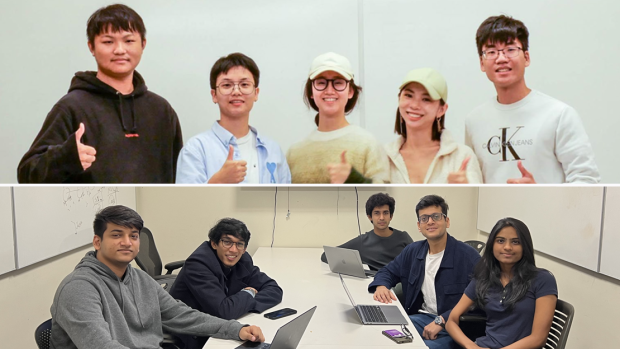Tandon teams triumph at the 2022 Bayer Digital Campus Challenge
Two Tandon teams take first and second place in international competition

Team Asprin (top) and Team Violet
Imagine running a company founded all the way back in 1863 — one so iconic that its name and logo are among the most recognized in the world. You might consider resting on your laurels and letting the digital age pass by. At Bayer, however, company executives think deeply about the opportunities that digitalization presents and the ways in which the venerable firm can grow and change to better serve patients and healthcare professionals.
To that end, in partnership with Agorize, a world leader in open innovation challenges, each year they host the Bayer Digital Campus Challenge, which asks teams of university students to envision the future of Bayer in a digitally transformed, trustful healthcare ecosystem. Industry Associate Professor of Technology Management and Innovation Mike Driscoll asked master’s students in his project-based Global Innovation course to participate in the hotly contested challenge, and when finalists were announced, two of the four teams hailed from Tandon.
"For the first time in the history of the Digital Campus Challenge (and the sixth edition is a ‘history’ for a digital competition, isn't it?), we have two finalists from one university,” Heiko Schomberg, Bayer's IT Workforce Director, who oversees the competition, explained when announcing the results.
The Tandon finalists
Team Aspirin
Team Aspirin (Howard Hong, Qingbo Li, Yicen Duan, Tianqi Chen, and Jiaying Yu) competed in the category of Good Digital Health Practice, which required participants to ponder how Bayer could provide precision medicine — the holy grail of modern medicine — to patients. They decided to tackle issues of eye health: According to the World Health Organization, the team explained, there are 2.2 billion people around the globe suffering from vision impairment or blindness — and at least 1 billion of these cases could be prevented or addressed using current medical methods. The situation is even more pressing when you consider the aging population. By age 75, approximately half of all Americans will have cataracts; glaucoma affects more than 2.7 million Americans aged 40 and older; and more than 4 million people over the age of 50 are affected by dry eye syndrome — a precursor to other problems.
Their solution: Vision health monitoring glasses they call EyeSnap, which use attached sensors to keep tabs on the condition of a wearer’s eyes (including signs of serious conditions like macular degeneration) and alert them to take action or contact their healthcare provider.
Team Violets
Team Violets (Deevanshu Srivastav, Aakash Sardesai, Saachee Deshmukh, Sudhanshu Maheshwari, and Nareshkumar Chandrahasan Senthilkumar) worked within the Data Science category to explore how that field could transform the life science industries and help get the right medication to the right patient at the right time. They focused on Chronic Kidney Disease (CKD), which affects 37 million adults in the U.S. — almost half of whom do not recognize the signs early enough to receive timely, effective treatment. The problem, the team learned, costs Medicare alone tens of billions of dollars a year
Their solution: Bayer dAIgnose, a platform that leverages real-world, anonymized data from the FDA. Taking into account factors like family history, demographics, and eating habits, it calculates the probability that a person will develop CKD and recommends courses of action — helping patients avoid dialysis and transplants and allowing hospitals to optimize their personnel and supplies.
Bayer judges considered the proposals’ customer focus, economic impact, and scalability, and when they were done with their difficult task, Team Aspirin was deemed the winner, with the Violets coming in a close second over finalists from Jordan and Hong Kong.
While the team members admitted it was difficult to compete against friends and classmates, they reminded themselves that having two Tandon groups in contention fortuitously meant that the school’s chances of winning were doubled — more important to them than any personal glory.
“With 320 teams from around the world taking part in the initial stages of the competition, we were naturally excited when two Tandon teams made the finals, and it’s even more exciting that the pair ended up in first and second place,” Driscoll said. “The tagline of the challenge was ‘How digital will Bayer be in 2032?’ and given the creativity and skill of students like mine, the answer is ‘very!’”

